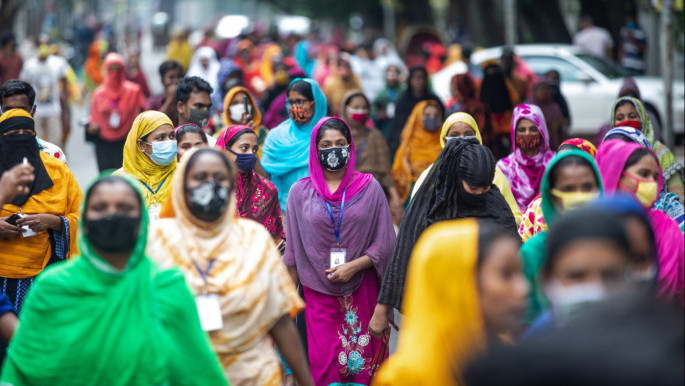The alliance further demanded justice for Shahidul Islam, an organiser for the Bangladesh Garment and Industrial Workers Federation (BGIWF), who was murdered on 25 June 2023 in front of the Prince Jacquard Sweater Ltd factory in Tongi after a meeting with its management staff.

The Clean Clothes Campaign, the garment industry’s largest alliance of labour unions and non-governmental organisations, has urged the BGMEA and the Bangladesh government to institute a Tk23,000 minimum wage for garments workers.
At a protest in Amsterdam outside the Best of Bangladesh expo on Monday, it also urged brands sourcing clothes to demand fairer wages for workers.
The alliance further demanded justice for Shahidul Islam, an organiser for the Bangladesh Garment and Industrial Workers Federation (BGIWF), who was murdered on 25 June 2023 in front of the Prince Jacquard Sweater Ltd factory in Tongi after a meeting with its management staff.
The alliance urged the factory and brands sourcing from the factory to ensure compensation of at least Tk24,934,830 (211,000 EUR) for Shahidul Islam’s family.
The Clean Clothes Campaign event registration was not granted, and thus they resorted to public actions.
The organisers of the action stressed the desire for dialogue but also noted that none of the panels in the Best of Bangladesh event featured any form of independent trade representatives.
In a statement published on the alliance’s website, it spurred the Bangladesh Garment Manufacturers and Exporters Association (BGMEA) to ensure a zero-tolerance policy for violence and retaliation against trade unionists, among a number of other demands.
“Without these measures, justice for this brutal murder, with widespread implications for Bangladeshi society and the rights of garment workers, will remain elusive. The organisers and participants of the event can make a stand today by speaking out for a 23,000 BDT minimum wage to show they are serious when they say they want change for the industry. For the sake of the garment industry and its workers, the government of Bangladesh, the BGMEA, and brands sourcing from Bangladesh must ensure that workers’ rights are upheld,” the statement said.
The first-ever “Best of Bangladesh” exposition in Europe – exhibiting only Bangladeshi products– started in Amsterdam, Netherlands on Monday, against the backdrop of Shahidul’s murder and the ongoing negotiations about renewing the minimum wage for garment workers.
The two-day national branding event was organised by Bangladesh Apparel Exchange (BAE), with support from the Embassy of Bangladesh, Ministry of Commerce, Export Promotion Bureau (EPB) of Bangladesh, and in association with PDS.
The RMG wage board was formed in 2018 and that year the minimum wage was fixed at Tk8,000, which was Tk5,300 earlier.
However, due to the increase in commodity prices, RMG workers could not wait for another five years for a new wage structure and took to the streets demanding a raise on several occasions.
Finally, the new wage board was formed in early April this year, including Sirajul Islam Rony as the representative of the workers and Bangladesh Garment Manufacturers and Exporters Association (BGMEA) former president Siddiqur Rahman as the factory owners’ representative.
After the formation of the board, the first meeting was held on 24 May. Senior District Judge Liaquat Ali Molla is the chairman of this minimum wage board.
People, including nearly 40 lakh workers in the garment industry, have been struggling with high inflation for the past year.
According to the Bangladesh Bureau of Statistics (BBS), inflation stood at 9.94% last May, which was the highest in the last 11 years. Overall, average inflation was above 9% in the fiscal year 2022-23, compared to the average inflation of 6% in the fiscal year 2021-22.
According to Section 141 of the existing Labor Act of Bangladesh, while formulating any recommendation (of wages), the wage board shall take into account the cost of living, standard of living, cost of production, productivity, cost of goods produced, inflation, type of work, risks and standards, business potential, country and area concerned. Socio-economic status and other relevant factors should also be considered.
















